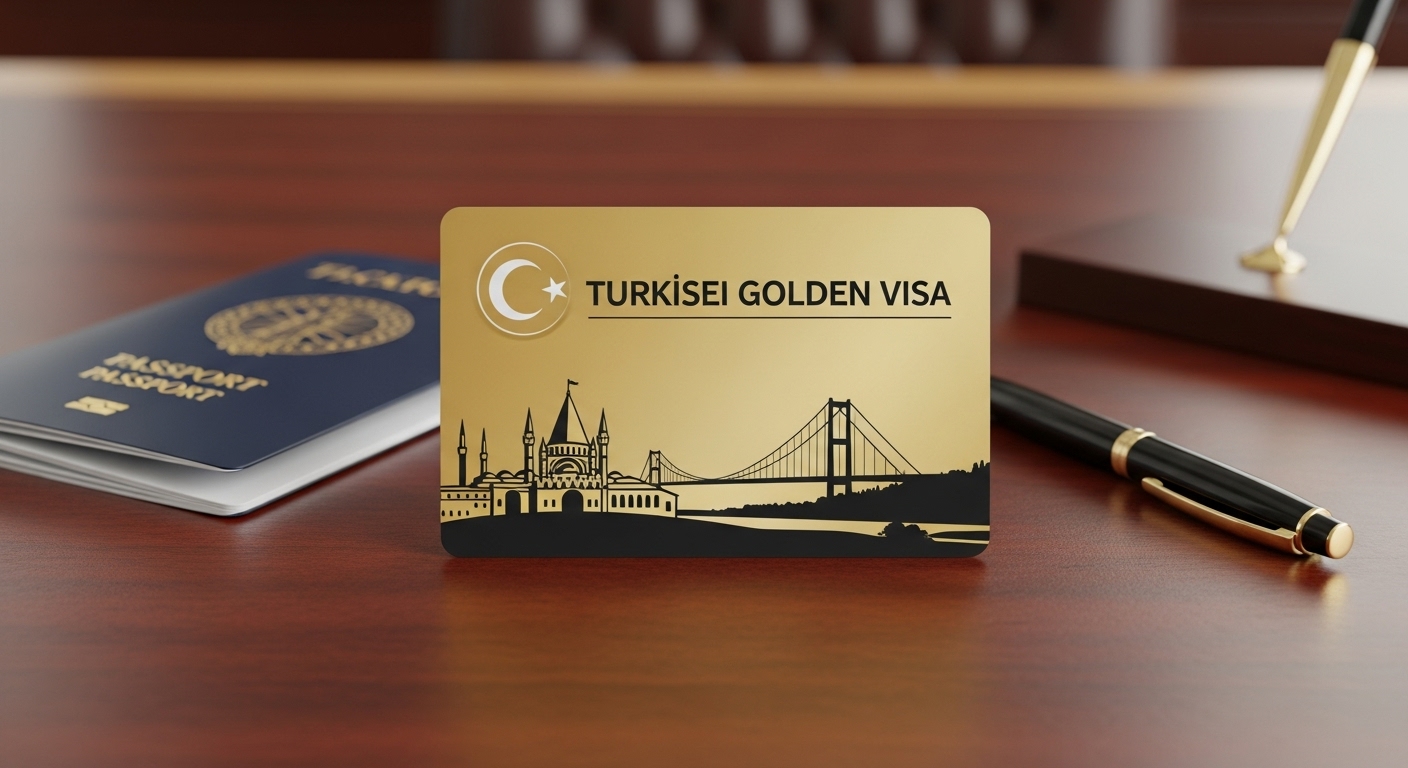Turkish Golden Visa – Everything You Need to Know in 2025
Discover the full guide to the Turkish Golden Visa in 2025, including investment options, benefits, legal requirements, and step-by-step application process for foreign investors.

Introduction to the Turkish Golden Visa
What is the Turkish Golden Visa?
The Turkish Golden Visa isn't an official program labeled as such, but it functions similarly to other Golden Visa schemes in Europe. Instead of a named "Golden Visa," Turkey offers a Citizenship by Investment (CBI) program that grants foreigners the right to obtain Turkish citizenship through qualifying financial investments. This initiative, launched in 2017, has become a popular route for global investors seeking a foothold in a geopolitically strategic nation that bridges Europe and Asia.
By making a minimum investment—often through real estate, bank deposits, or job creation—foreigners can gain not just residency, but full Turkish citizenship within months. Unlike traditional residency programs, this approach removes long waiting periods and language requirements, streamlining access to one of the world’s fastest-growing markets.
Whether you want to diversify your global portfolio, enjoy visa-free travel to over 110 countries, or simply gain a second passport, Turkey’s investment pathway is a viable and relatively accessible option. It’s especially attractive for citizens from countries with travel restrictions, limited passport power, or political instability.
Why is it Attracting Global Investors?
Turkey’s allure isn't just about the ease of acquiring citizenship—it’s also about the broader value proposition. Strategically located at the crossroads of Europe, Asia, and the Middle East, Turkey offers a unique blend of Eastern and Western cultures, robust economic potential, and diverse real estate opportunities.
Global investors see this not just as a legal migration path but a chance to benefit financially. The Turkish lira’s devaluation has made real estate investments even more attractive, offering high returns for those investing in property. Moreover, citizenship is granted to the whole family, including spouses and children under 18, making it an ideal package for future planning.
Political and economic shifts worldwide have also prompted high-net-worth individuals to seek safety nets in more stable or versatile jurisdictions. In this context, Turkey’s fast-track investment route to citizenship offers both a practical and strategic advantage.
Benefits of the Turkish Golden Visa
Visa-Free Travel Opportunities
One of the standout perks of Turkish citizenship is visa-free or visa-on-arrival access to more than 110 countries and territories. While it doesn’t currently offer visa-free entry into the European Union, Turkish passport holders can travel freely across much of Asia, South America, and parts of Africa.
For business professionals and digital nomads, this freedom can significantly reduce the hassle of planning international trips. No more lengthy embassy visits, no more complicated paperwork—just pack your bags and go.
Moreover, Turkey has active negotiations with several countries to increase the reach of its passport. Should any of these negotiations result in additional visa-free agreements, the value of Turkish citizenship will only grow stronger.
Path to Citizenship and Dual Nationality
Unlike residency programs that only grant the right to live and work in a country, Turkey’s investment program leads directly to full citizenship. Within approximately 3–6 months, you can obtain a Turkish passport, with no requirement to reside in the country before or after application.
Even better, Turkey recognizes dual nationality. This means you don’t have to renounce your current citizenship unless your home country forbids dual citizenship. You can enjoy the rights of a Turkish national while keeping your original identity and privileges.
This combination of speed, flexibility, and comprehensive benefits makes the Turkish CBI route a favorite among investors. Whether for legacy planning, personal freedom, or economic gain, the pathway is highly compelling.
Business and Investment Advantages
Turkey is not just a beautiful country with rich history and culture—it’s also an emerging economic powerhouse. As a Golden Visa holder (i.e., a new Turkish citizen), you’ll enjoy full access to its dynamic market. From tech startups and industrial manufacturing to agriculture and tourism, the opportunities are vast.
You’ll be able to start a business without local partners, invest in real estate without restriction, and tap into the growing demand for services in both domestic and international markets. Plus, with Turkey’s customs union agreement with the EU, businesses based in Turkey can access the European market more easily.
The economic diversification in Turkey makes it a hotbed for foreign direct investment, and by becoming a citizen, you can fully participate in this promising landscape.
Eligibility Criteria for Turkish Golden Visa
Who Can Apply?
Anyone over the age of 18 with a clean legal background and sufficient financial resources can apply for Turkish citizenship through investment. Turkey doesn’t restrict applications based on nationality, which is a significant advantage compared to other countries that may blacklist certain regions.
The program is open to individuals as well as entire families. The principal applicant can include their spouse and dependent children (under 18) in the same application, ensuring the whole family benefits from the citizenship status.
There is no requirement for prior residency, language skills, or work history in Turkey, making the barrier to entry lower than in many other investment immigration programs.
Financial and Legal Requirements
The Turkish Golden Visa—technically a Citizenship by Investment program—requires applicants to meet specific financial thresholds. The most popular route is purchasing real estate worth at least $400,000 USD. This property must be held for at least three years.
Other eligible investment types include:
Depositing $500,000 USD into a Turkish bank.
Investing $500,000 USD in government bonds.
Creating at least 50 jobs for Turkish citizens.
You’ll also need a clean criminal record, proven through official police clearance documents. Financial transparency is crucial, as all funds must come from legal sources and be transferred through the banking system.
Applicants must also undergo a background check and provide documentation proving the legality of their income and investments.
Required Documentation
To apply for Turkish citizenship through investment, you’ll need to prepare a comprehensive file. Common documents include:
Valid passport
Birth certificate
Proof of investment (property title deed, bank statements, or business registration)
Certificate of conformity from the relevant government body
Clean criminal record certificate
Marital status certificate (if applicable)
Proof of residence (local address in Turkey)
Biometric photos
These documents may need to be translated into Turkish and notarized. It’s highly recommended to work with a certified immigration lawyer or consultant to ensure everything is in order.
Investment Options for the Turkish Golden Visa
Real Estate Investment
Real estate is the most popular route to Turkish citizenship. The minimum required investment is $400,000, and it must be made in one or multiple properties that are not resold for at least three years. This option is attractive due to Turkey’s booming property market, which offers strong rental yields and capital appreciation potential.
You can choose from residential apartments, commercial units, or even land in major cities like Istanbul, Ankara, and Antalya. Many new residential projects cater specifically to foreign investors and come with rental guarantees.
Real estate transactions are tightly regulated by the government, and you must obtain a certificate of eligibility to confirm the property meets the citizenship criteria.
Bank Deposit Option
For those who prefer a lower-risk and more liquid form of investment, the bank deposit option offers a practical alternative. To qualify for Turkish citizenship via this method, an applicant must deposit at least $500,000 USD into a Turkish bank. This amount must remain untouched for a minimum of three years, though it will accrue interest depending on the bank's terms.
The deposit can be made in Turkish lira, US dollars, or euros, offering flexibility based on the investor’s preferred currency. This option is especially popular with individuals who prefer passive income and low involvement. Plus, unlike real estate, there’s no need to manage property, tenants, or maintenance issues.
Choosing the bank deposit route means less hassle and fewer ongoing responsibilities, making it ideal for retirees or those who want to diversify their holdings without locking up capital in real assets. The application process for this investment type is also relatively quick and straightforward when done through a licensed financial advisor.
Government Bonds and Capital Investment
Another viable route to Turkish citizenship is through government bonds or capital investments. Investors can purchase Turkish government bonds worth at least $500,000 and agree to hold them for a minimum of three years. Alternatively, they can invest the same amount in a Turkish capital investment fund or venture capital fund recognized by the Ministry of Treasury and Finance.
These options are suitable for financially savvy investors who are comfortable with market risks and want to support national development. Bond purchases are protected to a degree by the government, while investment fund returns depend on market performance.
This method is more complex than real estate or bank deposits, as it often requires working closely with a financial consultant to select appropriate instruments and manage legal compliance. However, it may offer higher long-term returns and contributes directly to the Turkish economy.
Job Creation in Turkey
If you're an entrepreneur or business leader, you might consider the job creation option to obtain Turkish citizenship. This method involves establishing a company or business that employs at least 50 Turkish nationals. It’s ideal for investors who plan to live and work in Turkey and have long-term business plans in the region.
Turkey’s labor market is competitive, and wages are relatively low compared to Europe and North America, making this a cost-effective route for expanding a business. You’ll need to provide proof of employment for 50 people, including contracts, payroll records, and tax filings. Your company will also undergo an audit by the Ministry of Family, Labor, and Social Services to confirm compliance.
This option is less common due to its operational complexity, but it’s perfect for those who wish to build a lasting economic presence in Turkey while positively impacting the local workforce.
Step-by-Step Application Process
Preparation and Documentation
The first step in the Turkish Golden Visa process is meticulous preparation. This includes choosing your investment type, gathering required documents, and working with a certified lawyer or immigration consultant to ensure everything complies with Turkish regulations.
Your documents must be notarized, translated into Turkish, and legalized, depending on your country of origin. Make sure your funds are ready and can be transferred legally into Turkey, as this is a requirement for all investment categories.
Additionally, it’s essential to open a Turkish bank account and obtain a tax identification number, both of which are necessary to complete the investment transaction.
Submitting Your Application
Once your investment is complete and documented, your legal team will submit the citizenship application to the General Directorate of Population and Citizenship Affairs. This includes a comprehensive portfolio detailing your personal background, investment proof, and all notarized documents.
After submission, you’ll be issued a short-term residence permit, which allows you to stay in Turkey while your citizenship application is processed. This permit is typically valid for one year but can be renewed if needed.
The application process is streamlined and efficient, often taking just 3–6 months. You can track the status of your application through your legal representative or directly via government portals.
Residence Permit and Beyond
Before you’re granted citizenship, you’ll be issued a Turkish residence permit as an interim step. This allows you and your family to legally reside in the country, access healthcare, and enroll in education systems.
Once your citizenship is approved, you’ll receive a Turkish passport, national ID card, and full rights as a Turkish citizen, including voting (after meeting certain criteria) and business ownership. The best part? You’re not required to live in Turkey at any point during or after the process.
This flexibility, combined with the program’s speed and affordability, makes the Turkish investment pathway one of the most attractive in the world.
How to Obtain Turkish Citizenship Through the Golden Visa
Timeline for Citizenship
The entire process of acquiring Turkish citizenship through investment typically spans 3 to 6 months from start to finish. However, this timeline can vary depending on the accuracy of submitted documentation, type of investment, and the workload of relevant Turkish government departments.
Here's a general timeline breakdown:
Week 1–2: Gather documents, open bank account, and get Turkish tax ID.
Week 3–6: Complete the investment (real estate purchase, bank deposit, etc.).
Week 7–10: Submit application and receive residence permit.
Month 3–6: Citizenship approval and issuance of Turkish passport.
For applicants seeking speedy citizenship without residency requirements, Turkey offers one of the fastest and most straightforward programs available globally.
Citizenship by Investment vs. Naturalization
While the Turkish Golden Visa program grants citizenship through financial investment, the traditional naturalization route involves long-term residence, employment, marriage to a Turkish citizen, or ancestry. These traditional paths require significant time (usually five years), proof of language proficiency, and integration into Turkish society.
In contrast, citizenship by investment is far more direct, does not require language skills, and can be completed without setting foot in the country. However, both options lead to the same end: a Turkish passport and full rights as a citizen.
Rights and Responsibilities of Turkish Citizens
As a Turkish citizen, you'll enjoy numerous rights, including:
Full access to the Turkish healthcare and education systems.
The ability to vote in national elections (after meeting eligibility).
The right to own property and conduct business without limitations.
Consular protection from Turkish embassies abroad.
You’ll also bear responsibilities, such as complying with Turkish laws and possibly serving in the military if you're a male citizen under a certain age (though exemptions or commutations may apply to foreign-born citizens).
Tax Implications for Golden Visa Holders
Tax Residency in Turkey
Understanding tax residency is crucial for any investor obtaining Turkish citizenship. In Turkey, you are considered a tax resident if you reside in the country for more than 183 days in a calendar year. Tax residents are subject to worldwide income tax, meaning income earned both domestically and abroad could be taxable in Turkey.
Non-residents, however, are taxed only on their Turkish-sourced income. This includes rental income from Turkish properties, dividends from Turkish companies, and income from local employment or business operations. The good news? Turkey offers relatively low personal income tax rates compared to Western Europe, ranging from 15% to 40%.
For investors who don’t plan to live in Turkey full-time, the non-resident status can be advantageous. But it’s vital to consult a tax professional to properly structure your financial affairs, especially if you have global income or assets.
Double Taxation Agreements
Turkey has signed double taxation agreements (DTAs) with more than 80 countries, including the United States, United Kingdom, Germany, Canada, and most EU nations. These treaties ensure that income is not taxed twice—once in your home country and again in Turkey.
This is particularly beneficial for Golden Visa holders with international businesses or investments. DTAs cover a range of income types, such as dividends, royalties, and pensions. To take advantage of these agreements, you'll typically need to provide a certificate of tax residency from your country and file certain forms with Turkish tax authorities.
These agreements add an extra layer of financial security for international investors and make Turkey a more attractive destination for those with diversified portfolios.
Legal and Immigration Support
Hiring a Professional Consultant
Navigating Turkish immigration laws, investment regulations, and real estate transactions can be complex, especially for foreigners unfamiliar with the system. That’s why hiring a certified legal consultant or immigration specialist is strongly advised. These professionals guide you through every step—ensuring that your documents are properly translated, notarized, and submitted.
A consultant also acts as your liaison with Turkish authorities, helping to avoid common pitfalls like delays, missing paperwork, or failed investment approvals. Many firms even offer end-to-end services, from property scouting to final passport issuance.
Look for consultants with a proven track record, official accreditation, and transparent pricing. Avoid brokers who overpromise and underdeliver, and always verify that the lawyer is registered with the Turkish Bar Association.
Avoiding Common Legal Pitfalls
Investors sometimes run into legal trouble due to simple oversights. Common issues include buying property that isn’t eligible for citizenship, miscalculating the minimum investment amount due to currency fluctuations, or submitting incomplete paperwork.
To avoid these problems:
Always obtain a Certificate of Eligibility from the relevant ministry (real estate, finance, or labor).
Use only verified escrow accounts for financial transactions.
Ensure that all property titles are clean and free of encumbrances or legal disputes.
Work with bilingual legal experts to handle translations and communications accurately.
Getting these details right from the start ensures a smooth and stress-free path to citizenship.
Real Estate Market in Turkey for Golden Visa Investors
Top Cities for Investment
Turkey offers a dynamic real estate market, and choosing the right city can significantly impact your investment returns. Istanbul remains the top choice for most foreign investors, thanks to its large population, tourism appeal, and strong rental demand. Areas like Beylikdüzü, Başakşehir, and Kadıköy are popular for both residential and commercial investments.
Other cities gaining traction include:
Antalya: A coastal gem with booming tourism, making it ideal for vacation rentals.
Ankara: The capital city with stable real estate prices and strong rental demand.
Izmir: A relaxed coastal city with a growing expat community and high quality of life.
Each of these cities has its own property dynamics, from luxury villas to budget apartments. The key is to align your investment goals—rental income, capital appreciation, or personal use—with the city’s strengths.
Property Types and Prices
The Turkish real estate market offers a wide range of property types. Options include:
Modern apartments in residential complexes
Luxury villas with sea views
Commercial offices and shops
Pre-construction projects with flexible payment plans
Prices vary significantly depending on the location. For example:
In Istanbul, prime residential properties start around $3,000–$5,000 per square meter.
In Antalya or Izmir, similar properties may cost as low as $1,000–$2,500 per square meter.
Turkey also allows foreign buyers to purchase multiple properties to reach the $400,000 investment threshold. This flexibility is ideal for investors looking to diversify their holdings.
Legal Aspects of Buying Property in Turkey
Buying property in Turkey is a relatively straightforward process, but it comes with some legal responsibilities. You’ll need to:
Obtain a TAPU (title deed) issued by the Land Registry.
Secure a DASK earthquake insurance policy (mandatory for all real estate).
Verify zoning permissions and construction approvals.
Work with a licensed property evaluator to ensure the asset meets the $400,000 threshold.
To protect your investment, hire an independent lawyer—not the one recommended by the real estate agent. They’ll perform due diligence, check the property’s legal status, and manage the title transfer process.
Comparison with Other Golden Visa Programs
Turkish Golden Visa vs. Portugal Golden Visa
The Portugal Golden Visa is widely considered one of the best in Europe, but how does it stack up against Turkey’s offering?
| Feature | Turkey | Portugal |
|---|---|---|
| Minimum Investment | $400,000 (real estate) | €500,000 (now suspended for real estate) |
| Timeline to Citizenship | 3–6 months | 5–6 years |
| Residency Requirement | None | Minimum 7 days/year |
| EU Membership | No | Yes |
| Travel Access | 110+ countries | 180+ countries (including EU) |
Portugal’s program offers better global mobility, especially within the EU. However, Turkey’s pathway is faster, more flexible, and doesn’t require physical residence—making it ideal for those seeking immediate benefits.
Turkish Golden Visa vs. Greece Golden Visa
Greece is another strong player in the Golden Visa space, especially for real estate investors.
| Feature | Turkey | Greece |
|---|---|---|
| Minimum Investment | $400,000 | €250,000 |
| Citizenship Eligibility | Immediate | After 7 years |
| Residency Requirement | None | No stay required |
| Schengen Access | Limited | Full access |
While Greece’s lower investment threshold is appealing, Turkey wins with its immediate citizenship benefit. Greece only offers residency initially, and gaining citizenship is more complex.
Continuing with the final section of the article: FAQs and Conclusion.
Common Challenges and How to Overcome Them
Documentation Hurdles
One of the biggest stumbling blocks for applicants is incomplete or incorrect documentation. Everything from a mistyped name on your passport to missing notarization can delay your application for weeks—or even months. Turkish authorities require all foreign documents to be translated, notarized, and sometimes apostilled, depending on your country of origin.
The solution? Work with a certified immigration consultant from day one. They’ll know exactly which documents are required, in what format, and how to legally translate and submit them. Keeping your paperwork precise and organized can shave weeks off your processing time.
Dealing with Bureaucracy
While Turkey has streamlined its citizenship-by-investment process in recent years, it’s still a country with layered bureaucracy. Different government departments handle various parts of the process, including the Ministry of Environment and Urbanization (for real estate) and the Ministry of Interior (for citizenship).
This can result in delays, miscommunications, or changing requirements. To navigate this maze, it’s essential to have a local representative who speaks Turkish and knows how to deal with public offices efficiently. Many professional consultants have direct relationships with key government offices, allowing them to resolve issues faster than foreign applicants can on their own.
Understanding Turkish Laws
Legal misunderstandings can derail even the most well-prepared application. From property purchase rules to investment restrictions, Turkey has very specific laws that may differ from what you’re used to in your home country.
For a deep dive into the real estate landscape and legal requirements, check out this guide on real estate agencies in Turkey. It walks you through property acquisition safely and legally.
Frequently Asked Questions About the Turkish Golden Visa
1. Can I sell my property after getting Turkish citizenship?
Yes, but only after holding the property for at least three years. If you sell it before that period, your citizenship may be revoked.
2. Is it necessary to live in Turkey to maintain citizenship?
No. There is no physical residency requirement for maintaining or renewing Turkish citizenship once it is granted.
3. Can I include my family members in the application?
Yes. You can include your spouse and children under 18 in a single application. Each family member will receive citizenship upon approval.
4. How long does the Turkish Golden Visa process take?
The entire process typically takes 3 to 6 months from the date of investment to receiving your passport.
5. Is Turkish citizenship permanent?
Yes. Once granted, Turkish citizenship is permanent and comes with full legal rights and responsibilities.
Conclusion
The Turkish Golden Visa—more accurately described as a Citizenship by Investment program—offers one of the fastest, most affordable, and flexible paths to second citizenship in the world. With a range of investment options, minimal bureaucracy, and powerful benefits like visa-free travel and full family inclusion, Turkey’s program is a strong contender for investors seeking global mobility and long-term financial security.
If you're leaning toward the bank deposit route to citizenship, it’s one of the safest and most passive options for gaining citizenship with minimal involvement.
Additionally, investors should be well-informed about property taxes in Turkey, which can impact both short- and long-term investment returns.
Make sure to do your homework, work with trusted professionals, and plan your investment carefully. With the right guidance, the Turkish Golden Visa could be your gateway to new personal freedoms and exciting global opportunities.
Have Question Or Suggestion ?
Please Share Your Thought, To Make It Real


